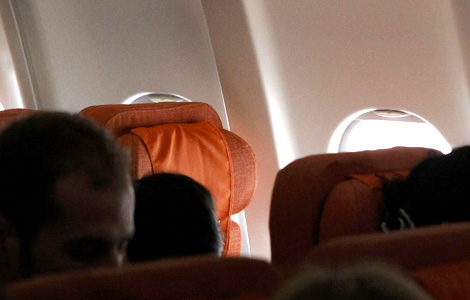Public views on privacy, security put US in tight spot
Updated: 2013-06-21 11:36
By Joe Boris (China Daily)
|
||||||||

Alongside the many questions about self-outed National Security Agency leaker Edward Snowden, Americans have revived a debate weighing their desire for privacy against their government's post-9/11 intelligence-gathering demands.
Two recent polls - one co-sponsored by the Washington Post, which along with UK newspaper the Guardian has published some of Snowden's classified revelations - reflect public ambivalence over what President Barack Obama has called "tradeoffs" in balancing those goals.
In the Post poll, conducted with the Pew Research Center, 56 percent of respondents said an NSA program that tracks the mobile-phone records of millions of Americans is "acceptable" in investigating potential acts of terrorism and 41 percent found the program an "unacceptable" encroachment.
Regarding a separate NSA program that taps into servers of US Internet companies to extract e-mail, photos and other data that could be used to track someone's movements and contacts, 52 percent of poll respondents said such monitoring shouldn't occur. Data collection under the program, called Prism, is supposed to be limited to communications that originate outside the United States.
A large minority (45 percent) of Americans polled, however, said their government should be allowed to go beyond the current program and "monitor everyone's" online activities if doing so "might prevent future terrorist attacks".
In the other poll, by Reuters/Ipsos, nearly half (47 percent) of respondents said that although they prefer that the NSA not collect "meta data" about their phone calls, they would find the tactic acceptable for preventing terrorism. A total of 44 percent expressed the same view when it came to government Internet surveillance.
About 37 percent said there could be no legitimate reason for the NSA to review phone records, and 44 percent said the same about online-activity monitoring.
Although Snowden last week disclosed crucial details about both NSA programs, their existence was leaked to media outlets in 2006, and opinion polls back then found a slightly closer divide between those who accept at least some impingement on their private communications and those who reject it.
Complicating, though not necessarily contradicting, the privacy picture is the frequency with which millions of Americans voluntarily share personal information online. Other polls have shown younger Americans don't have the same conventional expectations of privacy as their elders.
Wang Yang knows about such attitudes, both in his native China and in the US, where he is a researcher and Internet-studies professor.
"When I saw the Pew results, I was surprised because based on what I've learned in research is that Americans tend to be the most concerned with privacy," he told China Daily.
Last year, while working as a research scientist at Carnegie Mellon University, Wang and two colleagues analyzed the social-networking habits of users in the US, China and India. Not surprisingly, they found that Americans, as members of a society that prizes individualism, valued personal privacy online the highest, followed by the Chinese and Indians.
The pattern was reversed, however, on the question of social-networking users' desire to restrict information they disclose, with users in China the most cautious and their US counterparts the least.
"One possible explanation is that American users may be more privacy-concerned with regard to the site operator and businesses than with their interpersonal relationships," wrote Wang and fellow researchers Lorrie Faith Cranor and Gregory Norcie, adding that it may just be that US users post less-sensitive information and thus feel less of a need for restrictions.
Chinese users, on the other hand, tend to be most wary of the companies that operate social-networking sites, said Wang, who is now an assistant professor in Syracuse University's School of Information Studies. Those concerns can be shaped by nationalism: Wang recalled Chinese social networkers' angry reaction a few years ago to (unfounded) rumors that the owner of Kaixin001 might be acquired by a Japanese buyer.
Wang stresses that his privacy research hasn't addressed the kind of national-security concerns the recent US polls did, but he said there could be repercussions among Chinese users - who, after an early buzz, have largely ignored the Snowden story - for US Internet companies caught up in the NSA programs. A federal law allows the NSA to conduct surveillance of foreigners, but Google Inc, Apple Inc and Facebook Inc - fearing the wrath of users and governments abroad - have urged the US Justice Department to let them disclose data on the number of data requests they receive.
As in the US, attitudes about online privacy in China tend to vary by generation, Wang said. In both countries, many young users express undue, perhaps nave, confidence in being able to control how their personal information is used.
Most Chinese on social-networking sites "kind of know that in order to get these free services, you've got to give them something, but they're still not comfortable without those companies letting them know what their information is for. They understand there are privacy implications when you use the Internet."
Contact the writer at josephboris@chinadailyusa.com
(China Daily USA 06/21/2013 page10)
Most Viewed
Editor's Picks

|

|

|

|

|

|
Today's Top News
China shares trim losses after Monday shock
Gerui CFO seeks to form bond with investors
Green goals set for Beijing and nearby areas
Astronauts leave Tiangong-1 space module
Berlusconi convicted on sex charges
US presses Russia over Snowden
Emerging markets still react to Fed
Xi: 'Exploration part of Chinese dream'
US Weekly

|

|
















